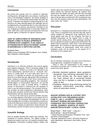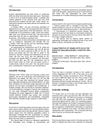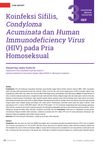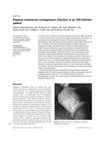 7 citations,
August 2020 in “Scientifica”
7 citations,
August 2020 in “Scientifica” Most HIV-positive patients had skin problems, and conditions like oral thrush and boils were linked to weaker immune systems.
 12 citations,
July 2014 in “International Journal of STD & AIDS”
12 citations,
July 2014 in “International Journal of STD & AIDS” HIV patients with lower CD4 T cell counts often have more skin problems.
 27 citations,
September 1992 in “The Lancet”
27 citations,
September 1992 in “The Lancet” ICL is a condition with low CD4+ T cells like AIDS but not caused by HIV, and normal CD4+ T cell counts may vary between men and women.
 11 citations,
January 1998 in “Dermatology”
11 citations,
January 1998 in “Dermatology” Isotretinoin effectively treated severe acne in HIV-positive women, with improved skin and CD4 counts, but some experienced side effects like skin dryness and hair loss.
 October 2015 in “Elsevier eBooks”
October 2015 in “Elsevier eBooks” Aldesleukin can treat certain cancers and increase HIV patient CD4+ counts but often causes severe side effects.
 2 citations,
November 2011 in “Journal of Infection”
2 citations,
November 2011 in “Journal of Infection” A woman with asthma improved from a severe fungal infection after treatment change, and most HIV-positive women in a UK study had low immune cell counts but were responding well to treatment.
 10 citations,
October 2015 in “Journal of the International Association of Providers of AIDS Care”
10 citations,
October 2015 in “Journal of the International Association of Providers of AIDS Care” A woman with HIV had a severe skin condition that improved with antiretroviral therapy.
10 citations,
January 1997 in “The journal of sex research/The Journal of sex research” Testosterone replacement therapy significantly improved sexual interest and function in HIV+ men.
 7 citations,
October 2013 in “British Journal of Dermatology”
7 citations,
October 2013 in “British Journal of Dermatology” HIV can cause skin disorders, which are often the first sign of infection, especially in people with darker skin.
 3 citations,
January 1996 in “Pharmacotherapy: The Journal of Human Pharmacology and Drug Therapy”
3 citations,
January 1996 in “Pharmacotherapy: The Journal of Human Pharmacology and Drug Therapy” Zidovudine may cause hair loss in advanced-stage HIV patients.
 1 citations,
August 2007 in “Indian Journal of Pediatrics”
1 citations,
August 2007 in “Indian Journal of Pediatrics” A girl with symptoms like an autoimmune disorder actually had HIV and a fungal infection, which was hard to diagnose and treat, leading to her death.
 8 citations,
August 1997 in “Australasian Journal of Dermatology”
8 citations,
August 1997 in “Australasian Journal of Dermatology” Most HIV patients develop skin symptoms that can indicate the stage of their disease.
1 citations,
July 2020 in “Qanun Medika - Medical Journal Faculty of Medicine Muhammadiyah Surabaya” Timely treatment with antibiotics and antiretrovirals can significantly improve health in HIV patients with syphilis.
 12 citations,
June 2005 in “Journal of the European Academy of Dermatology and Venereology”
12 citations,
June 2005 in “Journal of the European Academy of Dermatology and Venereology” A man with HIV developed skin and hair issues after starting HIV treatment, which improved with topical treatment.
 2 citations,
September 2021 in “International Journal of STD & AIDS”
2 citations,
September 2021 in “International Journal of STD & AIDS” People living with HIV in Turkey often have skin conditions, which are more common in advanced HIV stages and may help in diagnosing the infection.
 November 2011 in “Journal of Infection”
November 2011 in “Journal of Infection” Many women with HIV in the North of England are diagnosed late and have other health conditions.
 2 citations,
September 2014 in “Journal of evolution of medical and dental sciences”
2 citations,
September 2014 in “Journal of evolution of medical and dental sciences” Most HIV patients in the study showed skin and mucous membrane issues, with oral thrush being the most common.
 August 2022 in “MEDICINUS”
August 2022 in “MEDICINUS” A 22-year-old homosexual man was diagnosed with secondary syphilis, genital warts, and HIV, highlighting the high STI risk in men who have sex with men.
 16 citations,
January 2010 in “Indian Journal of Dermatology, Venereology and Leprology”
16 citations,
January 2010 in “Indian Journal of Dermatology, Venereology and Leprology” Children with HIV often have skin problems that can indicate the severity of their immune system damage.
 8 citations,
July 1996 in “Annals of Internal Medicine”
8 citations,
July 1996 in “Annals of Internal Medicine” Itraconazole may cause low platelet and white blood cell counts.
 July 1996 in “Annals of Internal Medicine”
July 1996 in “Annals of Internal Medicine” Long-term high-dose fluconazole can cause reversible hair loss.
 103 citations,
January 2011 in “Blood”
103 citations,
January 2011 in “Blood” Thymus transplantation successfully restored immune function in infants with FOXN1 deficiency.
 15 citations,
September 1992 in “The Lancet”
15 citations,
September 1992 in “The Lancet” Stopping minoxidil caused significant hair loss, but regrowth occurred after resuming use.
 64 citations,
August 1999 in “The American journal of medicine”
64 citations,
August 1999 in “The American journal of medicine” The transscrotal testosterone patch normalizes hormone levels in men with AIDS and weight loss but does not improve weight, body mass, or quality of life.
 53 citations,
November 1992 in “Mayo Clinic Proceedings”
53 citations,
November 1992 in “Mayo Clinic Proceedings” HIV can cause unusual and severe skin problems that are hard to treat.
 35 citations,
November 1996 in “Journal of the American Academy of Dermatology”
35 citations,
November 1996 in “Journal of the American Academy of Dermatology” Itraconazole was effective in treating unusual M. canis infections in only one of two HIV-infected men.
 13 citations,
July 1996 in “Annals of Internal Medicine”
13 citations,
July 1996 in “Annals of Internal Medicine” International medical graduates outperformed U.S. graduates on an internal medicine exam.
 13 citations,
July 1996 in “Annals of Internal Medicine”
13 citations,
July 1996 in “Annals of Internal Medicine” International medical graduates outperformed U.S. graduates on an internal medicine exam.
 11 citations,
May 1998 in “International Journal of Dermatology”
11 citations,
May 1998 in “International Journal of Dermatology” Using a blow dryer in a certain way can cause localized hair damage with bubble formation inside the hair.
 5 citations,
June 2019 in “Open Forum Infectious Diseases”
5 citations,
June 2019 in “Open Forum Infectious Diseases” Six African American women experienced hair loss after switching to a new HIV medication.




























